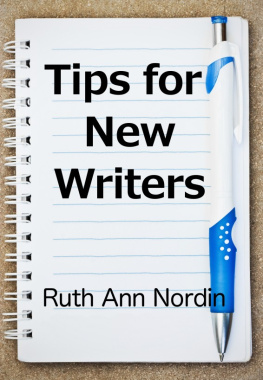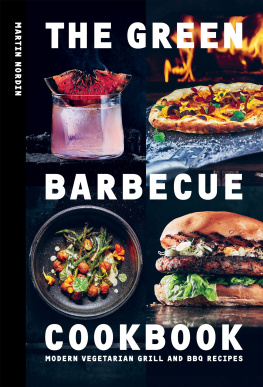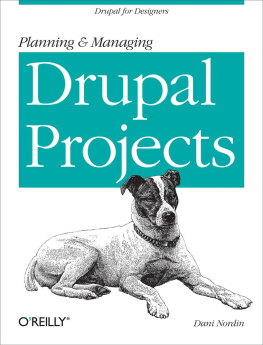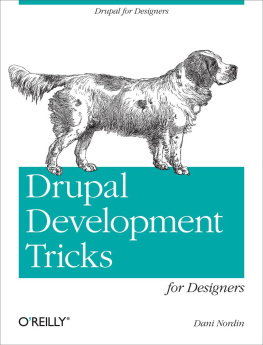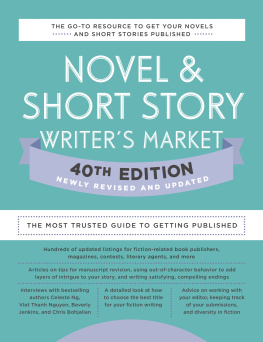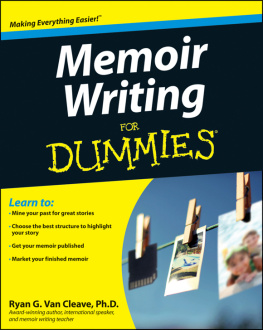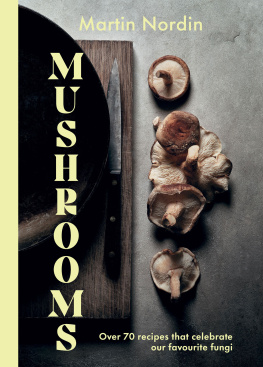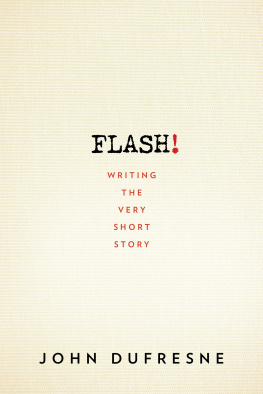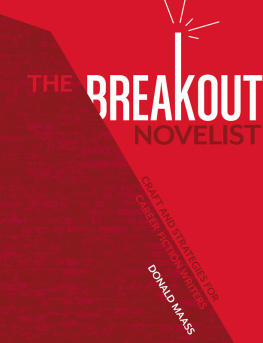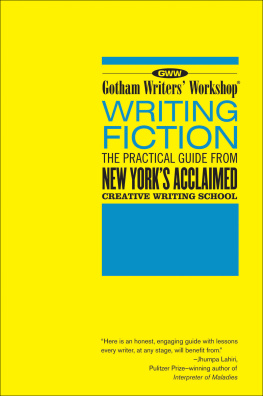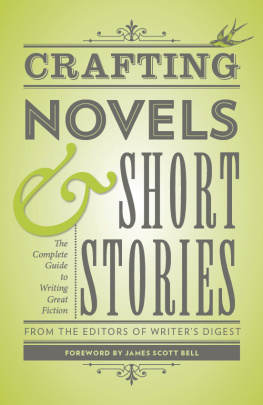Nordin - Tips for new writers
Here you can read online Nordin - Tips for new writers full text of the book (entire story) in english for free. Download pdf and epub, get meaning, cover and reviews about this ebook. genre: Detective and thriller. Description of the work, (preface) as well as reviews are available. Best literature library LitArk.com created for fans of good reading and offers a wide selection of genres:
Romance novel
Science fiction
Adventure
Detective
Science
History
Home and family
Prose
Art
Politics
Computer
Non-fiction
Religion
Business
Children
Humor
Choose a favorite category and find really read worthwhile books. Enjoy immersion in the world of imagination, feel the emotions of the characters or learn something new for yourself, make an fascinating discovery.
- Book:Tips for new writers
- Author:
- Genre:
- Rating:5 / 5
- Favourites:Add to favourites
- Your mark:
- 100
- 1
- 2
- 3
- 4
- 5
Tips for new writers: summary, description and annotation
We offer to read an annotation, description, summary or preface (depends on what the author of the book "Tips for new writers" wrote himself). If you haven't found the necessary information about the book — write in the comments, we will try to find it.
Tips for new writers — read online for free the complete book (whole text) full work
Below is the text of the book, divided by pages. System saving the place of the last page read, allows you to conveniently read the book "Tips for new writers" online for free, without having to search again every time where you left off. Put a bookmark, and you can go to the page where you finished reading at any time.
Font size:
Interval:
Bookmark:
Tips for New Writers
Ruth Ann Nordin
Tips for New Writers - Smashwords Edition
Published by Ruth Ann Nordin atSmashwords
Copyright 2015 by Ruth Ann Nordin
All rights reserved. No part of this book maybe reproduced or transmitted in any form or by any means,electronic or mechanical, including photocopying, recording, or byany information storage and retrieval system, without permission inwriting from the copyright owner.
This is a work of nonfiction with fictionalexamples to prove the authors point. Names, characters, places andincidents are either the product of the authors imagination or areused fictitiously, and any resemblance to any actual persons,living or dead, events, or locales is entirely coincidental.
Smashwords Edition, License Notes:
This ebook is licensed for your personalenjoyment only. This ebook may not be re-sold. If you would like toshare this book with another person, please do. Thank you forrespecting the hard work of this author.
Cover Photo images Dreamstime.www.dreamstime.com All rights reserved used with permission.
Wedded Bliss Romances, LLC
http://www.ruthannnordin.com
Starting With An Idea
Once you have an idea for a story, decidewhere you want to go from there.
1. Expand your idea to get a better feel forthe story that is developing.
Start looking into possible scenarios thatcould develop in your story. This is a brainstorming session.Everything is on the table. Ask lots of questions. Let yourimagination run wild. If you write them all down, you wont forgetthem later, but there are times when no pen is handy (like ifyoure driving on the interstate). So what I try to do in thesesituations is play the idea out as a movie in my mind to help meremember it.
Lets say this is my idea: I want to write astory about a married couple who are seriously thinking aboutgetting a divorce, but they hesitate to because of theirdaughter.
From there, you brainstorm smaller ideas togo with this main one. Like this: Perhaps, the husband is awork-a-holic, and the wife feels neglected. Maybe she was temptedto cheat but didnt, but maybe he believes she did. (Why? Thatwould have to be developed in the story.) So at the moment, theyreseparated as they try to figure out what to do.
Okay, so you have a few ideas. These ideasare not set in stone, and you dont have to have all the answers toall your questions. Its actually good if you dont because theseideas may change as you write the book. What this does is gives youa brief sketch of what youre working with.
2. Now, pick a beginning point.
What will your opening scene be? I suggestactually writing the beginning scene out. It doesnt have to becompletely fleshed out. All youre doing it getting a summary ofwhat happens. It should be at least a few hundred words long so youget a good grasp for it.
The reason for this summary is to help youset the tone for the rest of the book, and from it, you might comeup with other ideas you hadnt considered before.
For example, lets use myidea from above. (Im not going to writethe actual scene. All Im going to do is describe what I want tohappen.)
Ive decided the husband is going to bedriving in the rain on a deserted winding road. He has toperiodically slow down because of the storm, and theres anoccasional lightning bolt in the sky and thunder rumbling, whichmakes him jump. Hes running late from a business meeting, so hesin a hurry. Hes on his way to pick up his daughter, who has beenstaying at a friends house. He will have her stay with him for theweekend. Hes anxious because hes running late, and he feelsguilty, even though it wasnt his fault the meeting ran late. Whenhe gets to the house, he doesnt see any of the lights on, and itlooks as if no one has lived in it for years. He pulls out hisphone to make sure he got the right address. He did. Since no otherhouses are on the road, he gets out of the car and ignores the rainas he goes to the front door. He knocks, the door opens, and wefade out. The next scene will be with the wife.
I cut the scene off intentionally to makethe reader want to keep reading to find out what will happen tohim.
3. Now, pick an ending.
In romance, you know the ending. The heroand heroine end up together. This is a must for romance readers. Ifthe story doesnt have a happy ending, its a love story. It is nota romance. I specify this only because there seems to be someconfusion among writers unfamiliar with the genre. Do not classifyyour love story as a romance unless it has a happy ending where thehero and heroine end up together. Anything else will piss off youraudience.
In other genres, you can have a happy or sadending. There might even be some twist at the end that the readerdoesnt expect.
At this point, your ending might besomething like this: the heroine finally has the long awaited baby.Or this: our team of heroes defeat the bad guy and save the day. Ormaybe even this: I dont know, but I want it to be a happy one.
You can make the ending vague for now. Itdoesnt have to be fleshed out. But I find it helpful to at leasthave an idea of what its going to be because it helps give you adirection to head toward.
Picking Your Genre
I already discussed starting with an idea.One of the things I suggested was writing out the first scene (orat least part of it). Now here is what you do next:
1. Question your main story idea.
What thoughts popped up while you developedyour first scene? What new ideas came to you? Did your originalidea start to take on a life of its own? What tangents do you seethe story possibly going in?
While you dont have to write down theanswers to the questions above, you certainly can, especially ifyou want to tuck these notes away and refer to them later.
Ill use my example of thefather driving in the rain to give you an idea of what I mean byquestioning your main idea. (Below, I ambrainstorming where I want my idea to go based on what I developedso far.)
I want the husband and wife to reconcile. Butthis is not a romance. I could go with romantic suspense, but Idont want to do romantic suspense because that genre neverinterested me. The beginning is dark and eerie. Its creepy. Also,I dont want to focus on the romance between the man and woman. Iwant to focus on this creepy house and whats in it. I also want todevelop what is going on with the daughter. Who did she stay with?Is the man where he thinks hes supposed to be or somewhereelse?
Thats what I mean by questioning your idea.Youre getting a better feel for your story and exploring all yourpossibilities. Its all about getting your thoughts on paper (orsorted out in your mind).
2. Taking all the thingsyou came up with in #1, you should be able to come up with yourgenre. Ill use my example of the fatherdriving in the rain to explain the possible genres this book couldfall into. You can use a similar format with your own idea tobetter figure out the direction you want your story togo.
If your focus is on the estranged father andmother, their romance, and their happy ending, then youre doing aromance.
If a crimes been committed and the father iscalled in to deal with it, you might be dealing with a thriller ormystery.
If his daughter was abducted by aliens or ina genetic experiment or hes going into a parallel universe, youredealing with science fiction.
If he finds himself going to another worldwith magic, youre dealing with fantasy. If the magic is on thisworld, its urban fantasy.
If he finds himself having to enter a veryweird or bizarre situation where hes the prey (perhaps that manwhod wanted to sleep with his wife is coming after him but wedont know it until the end) so the husband is going to beterrified somehow, then we can say its horror. (Thriller could bea close one on this, so it depends on the level of terror in thebook. High terror and possible gore would make me say horror.)
Next pageFont size:
Interval:
Bookmark:
Similar books «Tips for new writers»
Look at similar books to Tips for new writers. We have selected literature similar in name and meaning in the hope of providing readers with more options to find new, interesting, not yet read works.
Discussion, reviews of the book Tips for new writers and just readers' own opinions. Leave your comments, write what you think about the work, its meaning or the main characters. Specify what exactly you liked and what you didn't like, and why you think so.

